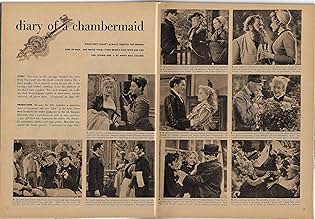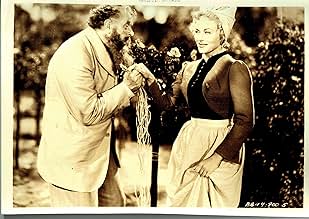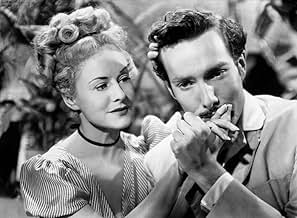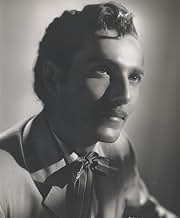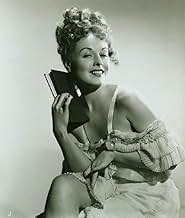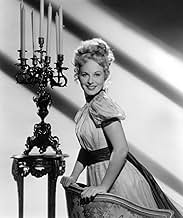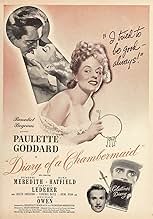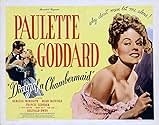VALUTAZIONE IMDb
6,5/10
1585
LA TUA VALUTAZIONE
Aggiungi una trama nella tua linguaA chambermaid plots to climb the social ladder by marrying a wealthy man.A chambermaid plots to climb the social ladder by marrying a wealthy man.A chambermaid plots to climb the social ladder by marrying a wealthy man.
- Regia
- Sceneggiatura
- Star
- Premi
- 1 vittoria in totale
Edward Astran
- Townsman
- (non citato nei titoli originali)
Arthur Berkeley
- Townsman
- (non citato nei titoli originali)
Chet Brandenburg
- Townsman
- (non citato nei titoli originali)
Egon Brecher
- The Postman
- (non citato nei titoli originali)
Jane Crowley
- Townswoman
- (non citato nei titoli originali)
Sumner Getchell
- Pierre
- (non citato nei titoli originali)
Jack Perry
- Townsman
- (non citato nei titoli originali)
Joe Ploski
- Townsman
- (non citato nei titoli originali)
Recensioni in evidenza
Chambermaid Paulette Goddard (Celestine) and the feeble, irritating Irene Ryan (Louise) arrive at the stately home in which they are to serve. They first meet the rather unpleasant valet, Frances Lederer (Joseph) before being introduced to Reginald Owen (Captain Lanlaire) and his wife Judith Anderson (Madame Lanlaire), who have an ill son, Hurd Hatfield (George). It becomes clear that it is Goddard's role to make his life better. Can she succeed....?
Paulette Goddard, Frances Lederer and Judith Anderson carry the film in terms of having a good cast but I'm afraid that's it. The film suffers by having too many buffoons - virtually everybody else. While Reginald Owen is OK as a bumbling old man, one is enough for any film. Unfortunately, we are also given Burgess Meredith as an extremely annoying old codger of a neighbour - he must be the most annoying character EVER. He constantly jumps and bounces around just like all old people do - you get my drift? He is so unconvincing that it's embarrassing. He is meant to be a likable, cheeky chappy. He isn't. Frances Lederer has a great moment with him towards the end of the film. Marvelous!
Frances Lederer keeps the tension ticking and is very watchable as the valet with something sinister going on in his head. The plot is good and keeps us watching as to how things will pan out for Goddard. Time to check the silverware.
Paulette Goddard, Frances Lederer and Judith Anderson carry the film in terms of having a good cast but I'm afraid that's it. The film suffers by having too many buffoons - virtually everybody else. While Reginald Owen is OK as a bumbling old man, one is enough for any film. Unfortunately, we are also given Burgess Meredith as an extremely annoying old codger of a neighbour - he must be the most annoying character EVER. He constantly jumps and bounces around just like all old people do - you get my drift? He is so unconvincing that it's embarrassing. He is meant to be a likable, cheeky chappy. He isn't. Frances Lederer has a great moment with him towards the end of the film. Marvelous!
Frances Lederer keeps the tension ticking and is very watchable as the valet with something sinister going on in his head. The plot is good and keeps us watching as to how things will pan out for Goddard. Time to check the silverware.
The Diary of a Chambermaid (1946) was directed by the great Jean Renoir. This is an U.S. film, although the action was set in France, and directed by a French director.
The movie is set in rural France in 1885. As the title suggests, a new chambermaid has arrived at a mansion of an eccentric couple. (Actually, almost everyone in the movie is eccentric to a greater or lesser degree.)
The person who's not eccentric, but totally evil, is the valet, Joseph. Francis Lederer portrayed Joseph, who is evil to the core. He looks like the villain that he is. (Actually, in one film. he played Count Dracula).
The reason to see is film is to watch Paulette Goddard at work. She was the classic Hollywood beauty of her time. And, 70 years later, she is still a classic Hollywood beauty. Better than that, she could act! Goddard plays Célestine, the chambermaid, whose only path out of lower-class drudgery is to marry a rich man. How this plays out is the plot of the film.
Renoir was possibly the greatest film director of the 20th Century. However, this movie is one of his minor films. Renoir does crowd scenes well, but he can't take his eyes off Goddard, and neither can we.
This movie has an anemic IMDB rating of 6.7. It's not a great film, but I think it's better than that. We saw it on DVD, and it worked well enough. Be sure to see it if you're a Renoir fan or a Goddard fan. Otherwise, I'd suggest Buñuel's 1964 version, with Jeanne Moreau.
The movie is set in rural France in 1885. As the title suggests, a new chambermaid has arrived at a mansion of an eccentric couple. (Actually, almost everyone in the movie is eccentric to a greater or lesser degree.)
The person who's not eccentric, but totally evil, is the valet, Joseph. Francis Lederer portrayed Joseph, who is evil to the core. He looks like the villain that he is. (Actually, in one film. he played Count Dracula).
The reason to see is film is to watch Paulette Goddard at work. She was the classic Hollywood beauty of her time. And, 70 years later, she is still a classic Hollywood beauty. Better than that, she could act! Goddard plays Célestine, the chambermaid, whose only path out of lower-class drudgery is to marry a rich man. How this plays out is the plot of the film.
Renoir was possibly the greatest film director of the 20th Century. However, this movie is one of his minor films. Renoir does crowd scenes well, but he can't take his eyes off Goddard, and neither can we.
This movie has an anemic IMDB rating of 6.7. It's not a great film, but I think it's better than that. We saw it on DVD, and it worked well enough. Be sure to see it if you're a Renoir fan or a Goddard fan. Otherwise, I'd suggest Buñuel's 1964 version, with Jeanne Moreau.
The Diary of a Chambermaid is a transitional film in the development of Renoir's lesser known stylistic system. Braudy would later distinguish Renoir's two systems as being tied to theater and realism respectively (although there have been compelling arguments about these categories being either reductive or simply misnomers). Goddard is the focus of the story (much in the same way Renoir later uses Magnani, Arnoul and Bergman). The camera tracks her action, her closeups are one-shot, there are alternating shot scales in single scenes to emphasize her character's psychological reaction to events, studio exteriors help idealize the framing of her screen personality and high/low angle shots purvey her psychological perspective on group dynamics. Celestine (Goddard) has an ambiguity to her motivation that heightens psychological identification. It is unclear as to whether she sees the world divided into classes or sexes, or both. The ending is a happy one, and the politics is further subverted through jovial and emotionally-charged highly-individualized characters. Non-diegetic soundtrack is employed to increase distinctions in the emotional responses of different characters. Depth of field is at the service of Celestine's staging while obstructions in the mise-en-scene become incorporated into the plot. In this respect, the camera is not an unobtrusive one. There is an inconsistency in the use of stylistics, where on one hand reframing pans are fully at the service of psychological identification and privilege of the transcendental subject position while the long take mobile framing of the July 14th celebration reminisce on M.Lange, Illusion and Regle. Diary is a melodrama with comedic elements to take the edges off, but when the master of the house reads in the morning paper "another woman murdered in Paris, another woman cut to pieces" there is no doubt that Renoir is infusing a consideration for the plight of women in a misogynist society. This was very important to him and perhaps the dark undertones of this film have something to say about the repression he experienced working in Hollywood for the war. How Burgess Meredith factors into all that remains to be seen.
France's most famous director, Jean Renoir, had to go to America to make his film of French author Octave Mirbeau's novel "The Diary of a Chambermaid". It was adapted for the screen by the actor Burgess Meredith, mainly as a vehicle for his then wife Paulette Goddard who plays the chambermaid Celestine who uses her wiles on the various men in the household where she is employed. It's a lovely performance in a film full of good performances. Others in the cast include Meredith himself, Hurd Hatfield, Reginald Owen and Judith Andereson but it's Francis Lederer as the malevolent manservant Joseph who walks off with the movie.
It's really a film of two halves. The early farcial elements seem overworked, (I know it's a film about eccentrics but such broad strokes hardly suit Renoir). However, the darkness that overwhelms the second half of the picture is magnificently handled by the director and is actually quite shocking. This is a very different film from the one Bunuel made in 1964 and perhaps all the better for it.
It's really a film of two halves. The early farcial elements seem overworked, (I know it's a film about eccentrics but such broad strokes hardly suit Renoir). However, the darkness that overwhelms the second half of the picture is magnificently handled by the director and is actually quite shocking. This is a very different film from the one Bunuel made in 1964 and perhaps all the better for it.
"Life is life. From now on I'm going to fight, and I'm going to fight hard, and I don't care who gets hurt, just so as it's not me."
"Don't be afraid of me. You and I are alike, maybe not in looks, but underneath we are the same."
"How does it feel to be in love?
"Plans can get you into trouble."
"We are not used to kissing in public.
"Where are you going?
"The more I'm beaten, the stronger I get."
"Don't be afraid of me. You and I are alike, maybe not in looks, but underneath we are the same."
"How does it feel to be in love?
- It changes all the time."
"Plans can get you into trouble."
"We are not used to kissing in public.
- Not in public. Are you ashamed? You shouldn't be ashamed of love. You should be proud. Take him in your arms, hold him, kiss him, embrace him!"
"Where are you going?
- Flying to the moon." 😂
"The more I'm beaten, the stronger I get."
Lo sapevi?
- QuizIt is sometimes said that this was the only film Jean Renoir made entirely inside a studio.
- BlooperWhen the Captain (Meredith) is going to the July 14 celebration, the shadow of the boom and mic are visible.
- Citazioni
Georges Lanlaire: I never found the urge to live or die on a big scale.
- ConnessioniReferenced in Tiovivo c. 1950 (2004)
I più visti
Accedi per valutare e creare un elenco di titoli salvati per ottenere consigli personalizzati
- How long is The Diary of a Chambermaid?Powered by Alexa
Dettagli
- Data di uscita
- Paese di origine
- Lingua
- Celebre anche come
- The Diary of a Chambermaid
- Aziende produttrici
- Vedi altri crediti dell’azienda su IMDbPro
- Tempo di esecuzione1 ora 26 minuti
- Colore
- Proporzioni
- 1.37 : 1
Contribuisci a questa pagina
Suggerisci una modifica o aggiungi i contenuti mancanti

